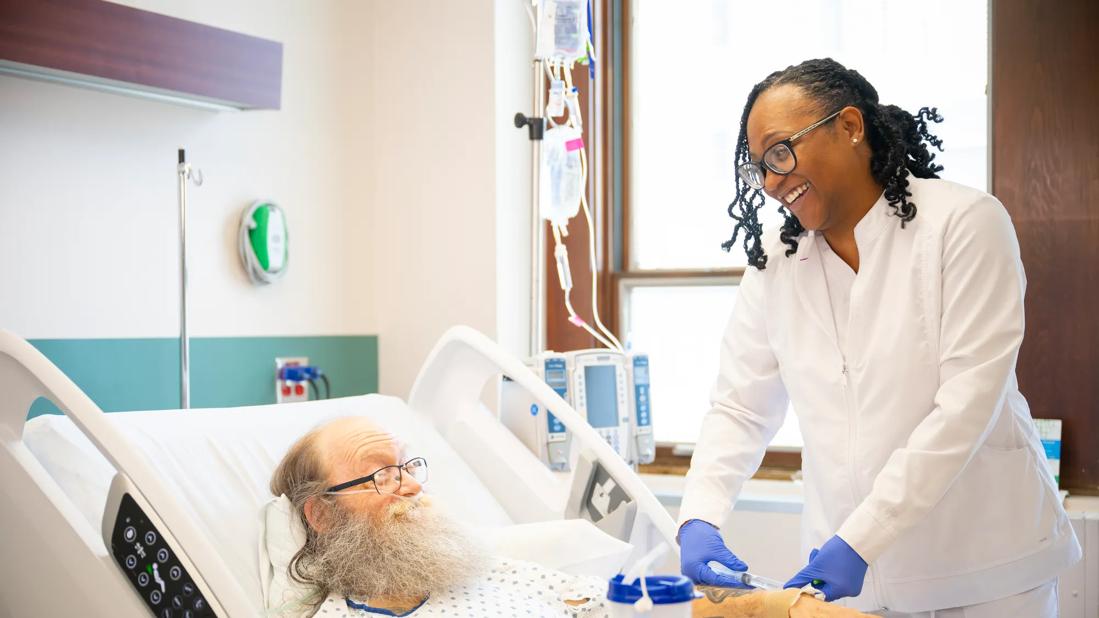Empower nurses to speak up, be accountable and more

By Meredith Foxx, MSN, MBA, APRN, NEA-BC, Executive Chief Nursing Officer
Advertisement
Cleveland Clinic is a non-profit academic medical center. Advertising on our site helps support our mission. We do not endorse non-Cleveland Clinic products or services. Policy
High reliability is a commonly repeated term in healthcare today. Rooted in quality and safety excellence, high-reliability cultures lead to better health outcomes and patient experiences, improved efficiency, increased job satisfaction and more.
Cleveland Clinic’s high-reliability journey began in 2011, when Cleveland Clinic Children’s joined seven other Ohio-based children’s hospitals on a mission to eliminate patient harm. Collectively, the initial work of the collaborative, which now includes more than 140 hospitals nationwide, led to a significant decrease in serious harm in these hospitals.
Becoming a highly reliable organization (HRO) with zero harm is an ongoing process that requires every member of every team working together. And nurses are vital to sustaining high-reliability environments.
Integral to every aspect of the care continuum, nurses are the eyes and ears of patients. They are trained to recognize the potential for error, and they often possess the knowledge to prevent it. Yet, due to healthcare’s historic chain of command and other factors, nurses often lack the confidence to speak up or act when they recognize a potential safety issue.
In recent years, Cleveland Clinic has been working hard to change that.
In 2021, the health system held “Stand Up for Safety,” reiterating Cleveland Clinic’s commitment to create a safe environment by promoting a questioning attitude, avoiding complacency, fostering personal accountability, and having a just culture and a goal of zero harm. The resounding message for all caregivers was: See something, say something, do something.
Advertisement
This episode of Cleveland Clinic’s Nurse Essentials podcast sheds light on the importance of empowering nurses to raise concerns about potential problems surrounding patient care and safety, including:
Important to remember is that empowering nurses to speak up is only one piece of the puzzle. Creating a culture of safety also demands listening. Speaking up only achieves so much if nurse leaders and other members of the caregiving team aren’t listening to or acknowledging nurses’ concerns. Speaking up and listening are equal parts of the equation.
Cleveland Clinic also introduced a new just culture decision tree to enhance our safety commitment. Nurses, and all caregivers, should learn from mistakes while improving systems to deliver highly reliable patient care.
Our just culture decision tree supports conversations between managers and caregivers about whether the response to a safety event requires systems changes, specific individual support or another intervention.
Nurse leaders play an important role in ensuring individuals and teams implement and use the just culture process. They should encourage nurses to think critically, speak up and openly share their perspectives while driving accountability. At Cleveland Clinic, nurse leaders are expected to:
Advertisement
Cleveland Clinic’s latest effort is centered on re-educating our more than 70,000 global caregivers, including 35,000 nurses, on high-reliability principles and expected behaviors.
The campaign started in 2022 with health system leaders. Leaders have the power to influence culture and shape behavior, so it’s important that they walk the high-reliability walk and then hold their teams accountable. Our leaders took online courses on promoting high-reliability principles, which they do by following the LEAD acronym:
Each LEAD behavior has resources that support it, and leaders were trained on how to use these tools to hold high-reliability discussions with their teams.
We extended the re-education campaign to all caregivers in 2023. Caregivers were asked to complete one 30-minute online module per month. The interactive, self-guided modules contain questions, videos, quizzes and real-life examples of Cleveland Clinic patients and caregivers. Each module highlights one expected behavior within the CORE acronym:
After all the caregivers on a team have completed their monthly module, the team leader brings the group together for healthy discussion about expected behaviors. Nurse managers talk with nursing caregivers about the behaviors that affect their daily lives, including the importance of closed-loop communication, embracing accountability, showing up for themselves and others, and courageously speaking up for safety. They also share helpful tools that support healthy behaviors.
Advertisement
The primary goal of the discussions is to help nurses garner a better understanding of what can go wrong and how to prevent errors. In a short period of time, Cleveland Clinic has seen an increase in safety event reporting, indicating that caregivers feel more comfortable about reporting near-misses and potential problems.
Team members are also asked to rate the effectiveness of each leader-guided discussion. Scores and feedback are used to assess the overall influence on Cleveland Clinic’s culture and effect on employee engagement, outcomes, serious safety events, etc. Aggregate data is collected and analyzed continuously at system, hospital and unit levels.
In nursing, it’s our job to do what’s right by the patient. Our daily work includes understanding, acquiring, developing and practicing the skills needed to improve patient care. All nurses should be empowered to make decisions when critical issues arise. Bolstering the role of the nurse within high-reliability cultures will advance quality and safety processes and outcomes and make a notable impact on a healthcare organization’s ability to become an HRO.
Advertisement
Advertisement

Regional organizations collaborate to address nurse faculty shortage

How wellness habits help nurses flourish

Planning continues with critical, patient-focused input from nursing teams

Strengthening care through targeted resources and frontline voices

Embracing generational differences to create strong nursing teams

CRNA careers offer challenge and reward

An unexpected health scare provides a potent reminder of what patients need most from their caregivers

Cleveland Clinic Abu Dhabi initiative reduces ICU admissions and strengthens caregiver collaboration